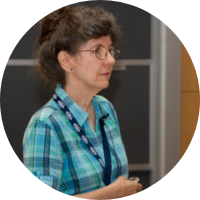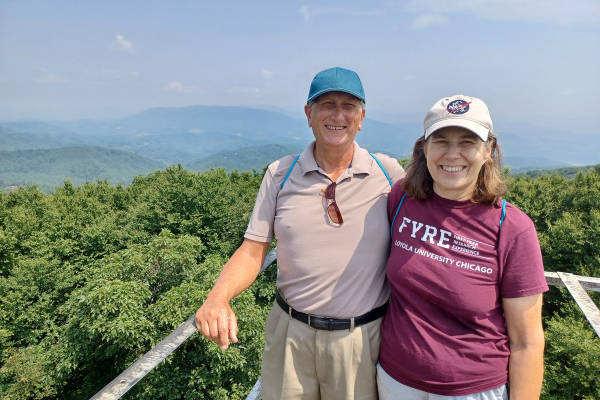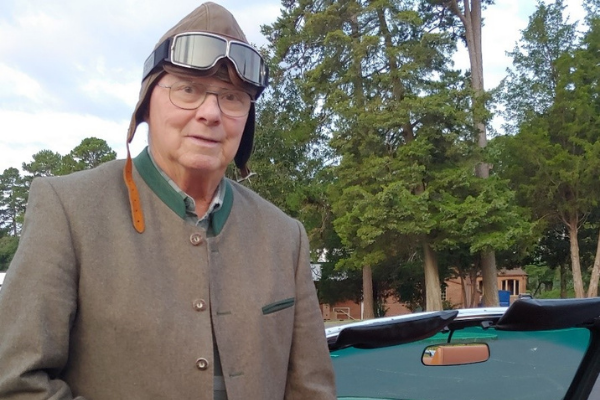
Did you choose retirement? Or was it chosen for you?
A layoff from Hercules after 29 years of heart-and-soul efforts was definitely not chosen. Retirement from ATK (now Northrup-Grumman) after 10 more years was well planned.
How was the transition from the working world to retirement?
After my first “retirement” at age 56, I did some consulting until I found a local position at ATK. I also co-authored a book on interpreting NIR spectra, gave talks and taught short courses. Following the ten years at ATK, my transition began, as it does for many others, by doing projects that had been put off. These included such things as tiling the basement floor, adding some drywall to an unfinished basement wall, building and repairing old wooden dollhouses, and a major effort to remove invasive plants from our four acres of land.
Then, some boredom set in, as my husband does not like to travel. Instead, I have increased my interactions with Girl Scouts, and now lead three outreach troops, mostly to children of local migrant farm workers. I am also heavily involved with a hobby group of miniaturists, and currently run their annual show and sale.
What’s your best advice for someone in their 20s/30s?
Plan on continuing education. Complete what degrees you can, but then go back again part-time if necessary.
What do you enjoy most about being retired?
Staying home during bad weather, or when roads are icy.
What’s the biggest challenge you have confronted to this point in your retirement?
Filling the days. After so many years of rushing around, working extra hours, continuing education, taking care of children, cooking/food shopping, etc., it is hard to fill up each day sometimes.
How do you stay connected to the chemistry enterprise as a retiree?
I help organize the children’s NCW event each year, and find ways to introduce chemical principles to Girl Scouts. I am also on the governing board of the Eastern Analytical Symposium.
What’s a travel destination you can’t wait to get back to?
None. I have been to Australia, the Netherlands, Denmark, Bahrain, the UK, Italy, and other countries at conferences or on business travel. Many times I traveled alone, but sometimes with a son or two, and even occasionally with my husband who doesn’t like to travel. I have done all the traveling I want to do, and now find it a nuisance.
What do you like most about where you are living in retirement? What’s one thing you wish you could change about where you live?
Southeastern Pennsylvania provides very beautiful natural scenery, and is a fairly uncrowded area. I would like better public transportation so I don’t have to drive much. I hope that self-driving cars will be able to handle hilly, semi-rural roads someday.
What guidance do you have for people who are getting ready to retire?
Look for ways to make yourself useful. There are many volunteer opportunities that will keep you in contact with other people.

Lois Weyer obtained a BA in chemistry from Douglass College/Rutgers University and an MS from the University of Delaware. Much later, she obtained a PhD in analytical chemistry also from the University of Delaware. Initially placed in the Hercules Research Center UV lab, doing what was then considered “women’s work,” she eventually expanded her role into near IR spectroscopy and its special usefulness for online chemical process analysis. Helping to open up this technology meant traveling to many company sites to work on installations, as well as presenting at conferences, publishing papers, and teaching short courses.
Unfortunately, during a company cutback that used the criterion called “work process” (i.e., how your job connected to projects being done only at the research center), she was let go after 29 years at Hercules. Although she introduced a number of process analysis projects that had saved millions of dollars, improved safety, and reduced waste, supporting process improvements at production sites did not fit into the research center work process paradigm.
Thanks to a connection made as a result of local Delaware Local Section ACS volunteer efforts, a new career opened up at ATK (now Northrup-Grumman) in nearby Maryland. This was also a research lab, but with only one analytical chemist instead of over 50 specialists. Continuing a life-long habit of problem solving, making-do, and stretching boundaries, Dr. Weyer ended up running IR, optical microscopy, electron microscopy, X-ray analysis, GC-MS, and ICP equipment to solve rocket motor and propellant problems.
Throughout her career, Dr. Weyer held many Delaware Local Section ACS positions, including being chair in 2001, running a process analysis specialty group, editing the newsletter, and creating early versions of email and website communications. She remains active in organizing the section’s annual National Chemistry Week event.
This article has been edited for length and clarity. The opinions expressed in this article are the author's own and do not necessarily reflect the view of their employer or the American Chemical Society.












